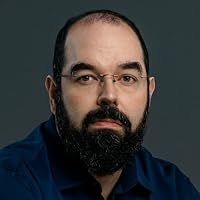Occams Razor Quotes
Quotes tagged as "occams-razor"
Showing 1-10 of 10

“You gave too much rein to your imagination. Imagination is a good servant, and a bad master. The simplest explanation is always the most likely.”
― The Mysterious Affair at Styles
― The Mysterious Affair at Styles

“And this shows that people want to be stupid and they do not want to know the truth. And it shows that something called Occam's razor is true. And Occam's razor is not a razor that men shave with but a Law, and it says:
Entia non sunt multiplicanda praeter necessitatem.
Which is Latin and it means:
No more things should be presumed to exist than are absolutely necessary.
Which means that a murder victim is usually killed by someone known to them and fairies are made out of paper and you can't talk to someone who is dead.”
― The Curious Incident of the Dog in the Night-Time
Entia non sunt multiplicanda praeter necessitatem.
Which is Latin and it means:
No more things should be presumed to exist than are absolutely necessary.
Which means that a murder victim is usually killed by someone known to them and fairies are made out of paper and you can't talk to someone who is dead.”
― The Curious Incident of the Dog in the Night-Time

“
Entia non sunt multiplicanda praeter necessitatem.
No more things should be presumed to exist than are absolutely necessary. ”
― The Curious Incident of the Dog in the Night-Time
No more things should be presumed to exist than are absolutely necessary. ”
― The Curious Incident of the Dog in the Night-Time

“Dullards would have you believe that once you have eliminated the impossible, whatever remains, however improbable, must be the truth... but to a mathematical mind, the impossible is simply a theorem yet to be solved. We must not eliminate the impossible, we must conquer it, suborn it to our purpose.”
― Professor Moriarty: The Hound of the D'Urbervilles
― Professor Moriarty: The Hound of the D'Urbervilles

“In order to avoid believing in just one God we are now asked to believe in an infinite number of universes, all of them unobservable just because they are not part of ours. The principle of inference seems to be not Occam's Razor but Occam's Beard: "Multiply entities unnecessarily.”
― What We Can't Not Know: A Guide
― What We Can't Not Know: A Guide

“Observations in cosmology look just as they can be expected to look if there is no God.”
― God: The Failed Hypothesis: How Science Shows That God Does Not Exist
― God: The Failed Hypothesis: How Science Shows That God Does Not Exist

“You have to disentangle the details. You have to hold up every one independently, and ask, "How do we know *this* detail?" Someone sketches out a picture of humanity's descent into nanotechnological warfare, where China refuses to abide by an international control agreement, followed by an arms race ... Wait a minute—how do you know it will be China? Is that a crystal ball in your pocket or are you just happy to be a futurist? Where are all these details coming from?
Where did *that specific* detail come from?”
―
Where did *that specific* detail come from?”
―

“The complex order we now observe [in the universe] could *not* have been the result of any initial design built into the universe at the so-called creation. The universe preserves no record of what went on before the big bang. The Creator, if he existed, left no imprint. Thus he might as well have been nonexistent.”
― God: The Failed Hypothesis: How Science Shows That God Does Not Exist
― God: The Failed Hypothesis: How Science Shows That God Does Not Exist

“Two years later the logic of the struggle led (Pope) John XXII to excommunicate William of Ockham, the English Franciscan, known for his forceful reasoning as “the invincible doctor.” In expounding a philosophy called “nominalism,” Ockham opened a dangerous door to direct intuitive knowledge of the physical world. He was in a sense a spokesman for intellectual freedom, and the Pope recognized the implications by his ban. In reply to the excommunication, Ockham promptly charged John XXII with seventy errors and seven heresies.”
― A Distant Mirror: The Calamitous 14th Century
― A Distant Mirror: The Calamitous 14th Century

“In the twenty-first century, American democracy slit its wrists on Occam’s Razor, and no one answered for the blood.”
― They Knew: How a Culture of Conspiracy Keeps America Complacent
― They Knew: How a Culture of Conspiracy Keeps America Complacent
All Quotes
|
My Quotes
|
Add A Quote
Browse By Tag
- Love Quotes 100.5k
- Life Quotes 79k
- Inspirational Quotes 75.5k
- Humor Quotes 44k
- Philosophy Quotes 30.5k
- Inspirational Quotes Quotes 28.5k
- God Quotes 27k
- Truth Quotes 24.5k
- Wisdom Quotes 24.5k
- Romance Quotes 24k
- Poetry Quotes 23k
- Life Lessons Quotes 22k
- Quotes Quotes 20.5k
- Death Quotes 20.5k
- Happiness Quotes 19k
- Hope Quotes 18.5k
- Faith Quotes 18.5k
- Inspiration Quotes 17k
- Spirituality Quotes 15.5k
- Relationships Quotes 15.5k
- Religion Quotes 15.5k
- Motivational Quotes 15k
- Life Quotes Quotes 15k
- Love Quotes Quotes 15k
- Writing Quotes 15k
- Success Quotes 14k
- Motivation Quotes 13k
- Travel Quotes 13k
- Time Quotes 13k
- Science Quotes 12k

